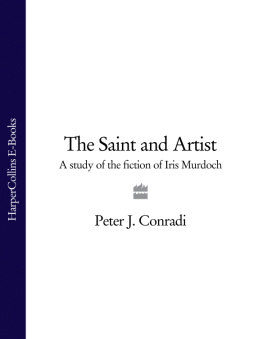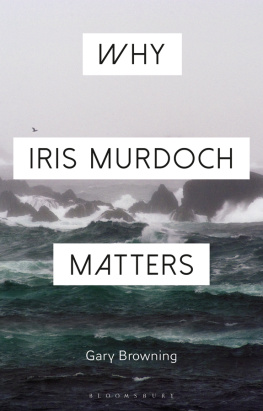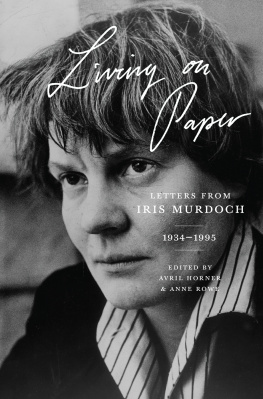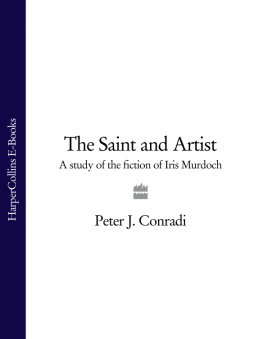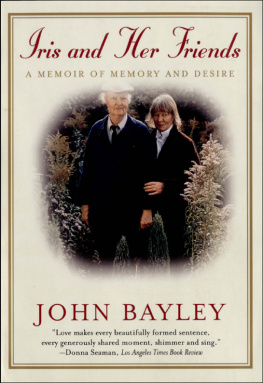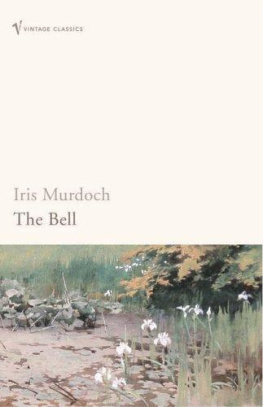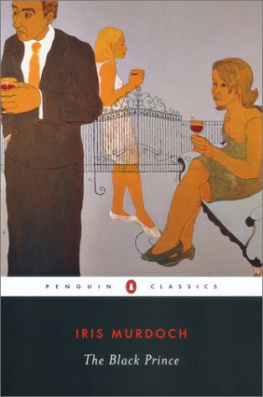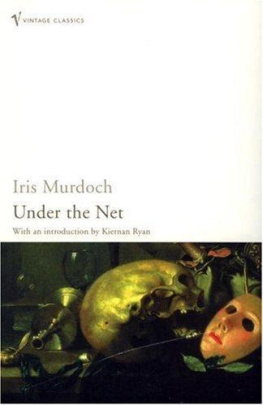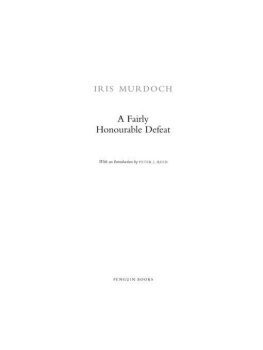The novel itself, of course, the whole world of the novel, is the expression of a world outlook. And one cant avoid doing this. Any novelist produces a moral world and theres a kind of world outlook which can be deduced from each of the novels. And of course I have my own philosophy in a very general sense, a kind of moral psychology one might call it rather than philosophy.
1
Existentialist and Mystic
I ris Murdoch was the author of some twenty-six novels, a handful of plays and poems, a number of influential articles, a book on Sartre, two books of her own moral philosophy, and a book on Platos theory of art. She is a writer of international reputation. Apart from monographs there has been no full-length study of her work by a British critic since A.S. Byatts valuable, pioneering study Degrees of Freedom: The Novels of Iris Murdoch (1965). Despite the honours that the later work won The Black Prince won the James Tait Black Memorial Prize in 1973, The Sacred and Profane Love Machine won the Whitbread Prize in 1974, The Sea, The Sea the Booker Prize in 1978 it has not been properly celebrated. I believe that the early theory, and also the real but limited success of the early apprentice fiction, have obscured the enormous, disorderly merits of the later work, which in its turn must alter the way we view the earlier.
Few writers divide their audiences as radically. Between Murdochs advocates and her detractors there is a gulf fixed. Elizabeth Dipples useful missionary Work for the Spirit (1982) sought to bridge this gap and to convert the latter into the former. This study is not, by contrast, a proselytising one. It seeks to persuade no one who does not already enjoy her work, but to describe some of the pleasures which an excessively narrow critical focus has neglected. This is a celebratory study whose aim is to try to illuminate her best work and to give some account of why she is found both entertaining, and also serious and important.
Most artists understand their own weaknesses far better than the critics do, says Arnold Baffin in The Black Prince, a writer unflatteringly parodied, as his creator has been, for emptying himself in his books over the world like scented bath-water, and as living in a sort of rosy haze with Jesus and Mary and Buddha and Shiva and the Fisher King all chasing round and round dressed up as people in Chelsea (BP 137). Iris Murdoch is her own best critic and best defendant. She gives the prolific Baffin an eloquent self-defence too The years pass and one has only one life. If one has a thing at all one must do it and keep on and on trying to do it better. And one aspect of this is that any artist has to decide how fast to work. I do not believe that I would improve if I wrote less. The only result of that would be that there would be less of whatever there is (172).
Murdochs frailties are by now well chronicled. Borrowing her own lofty criteria and sometimes drawing on her Peccavis, reviewers have sometimes been content to issue bulletins of high-minded reproof and adopt a tone of puritanical strictness. In what follows I do not seek to whisk her away into academic irreproachability. It is in some sense her human quality that seems to me engaging her quality of, in the best sense, stubborn imperfection. She can be uneven, over-intellectual or romantic. There is some unfinished and repetitive writing. The books can seem contrived or over-plotted, the characters sometimes insufficiently imagined. Her social range is not huge; she says little about work and often appears to take money for granted. She can seem to be playing a complex game with the reader. There is, as early reviewers noted, too much in the books.
The objections are by now well canvassed. Her virtues need cataloguing too. She writes spellbinding stories in beautiful prose. She knows how to master paragraphs and sentences and at her best achieves an extraordinary, luminous, lyrical accuracy. She has an intensely visual imagination and can use it to evoke things, people, the activity of thinking, feeling, places, cars and dogs too. In each novel are things that no other British writer has the power to describe. Her empirical curiosity and moral energy seem endless. Few other writers are as full of the naked pleasures of looking and describing. She can tackle happiness, that deep, confiding slow relationship to time (SPLM 16), the subject-matter for great writers. (Every fool can write about misery.) London is a real presence in the books, indeed seems to figure sometimes as an extra character, and even when her people are having a hellish time there, which is often, the authors loving and patient apprehension of the city comes through. This is the more noticeable in that, Dickens and Woolf apart, London has lacked distinguished celebrants. There is no touch of neurotic agrarianism in Murdoch, and if London had its Samuel Palmer it might well be her. But she can of course evoke the inner world, the world of fantasies, projections, demonic illusions too. No one writes better about the urgencies and illusions of the moral life. She is our most intelligent novelist since George Eliot, and like George Eliot she was a mature thinker before she wrote her first novel. Her technique altered significantly as the novels progressed. Many of her leading ideas are already there in her first work.
Does our sense that the novels feel contrived damage the illusion that the characters are free? Decreasingly, I think. The point has too often been argued in a simple-minded manner. Even in the most Gothic of her novels the characters seem alive. What she writes owes much to romance, or indeed in the case of Shakespearian drama, which her work increasingly contemplated and was nourished by. The plots of King Lear or Much Ado About Nothing are not realistic, and at the end of Twelfth Night we share in a triumph of the improbable. These are plots which can grip you in the theatre and mock your attempts to recount them outside. You put up with the contrivance and conscious stylisation for the sake of the illumination they offer, and the degree of trust you show depends on the good will you bear the author, and the reward her illusions purchase. As Murdoch put this in the 1982 Gifford lectures in good art we do not ask for realism; we ask for truth.
Truth, of course, has had a bad press recently, and thus the question of stylisation has a way of returning. One reviewer recorded how his feeling on opening a Murdoch novel But surely human beings are not like this can be swiftly followed by the feeling Perhaps this is just what human beings are in fact like, and it is precisely our delusion to imagine that we are not.her characters are recognisable. These vain bookish civil servants, morally squeamish men whose sheer egoism is driving them mad, emotionally greedy women, precocious adolescents, isolated and awkward good characters, all involved in the great, lonely hunt for love and consolation and power: it is not a bad image of the world. It has universality too.
There are related points to be made about contrivance. Her best work is quiveringly real/unreal in its texture. What can be perplexing is not that she fails to convince, but that she can describe with an extraordinary hallucinatory validating detail and power the most unlikely situations, so that, before you have time to decide whether or not you believe in them, you find yourself forced to imagine them. Her ingenious style of realism, in combining fantasy with a meticulous naturalistic rendering of detail, shares something with surrealism. It can drive a wedge between reason and imagination, so that we concur imaginatively, against reasons good advice; reason is dulled in something like awe at her sheer aesthetic nerve and inventiveness. In Chapter 5 I discuss how the limits to rationalism become for her a great theme. Her use of contrivance seems to relate to this, a deliberate and shameless affront, unbelievable in a way that mimics and parodies the frequently unbelievable quality of life too. Unreality, in other words, can be a potent aesthetic device. The task of classifying, as her work often asserts, can perhaps never be more than a (serious) game; but visionary or magical realism seems to get closer than most descriptive terms to the special and disturbing pleasure her work can afford. The question of artifice has too often been divorced from the question of pleasure.

